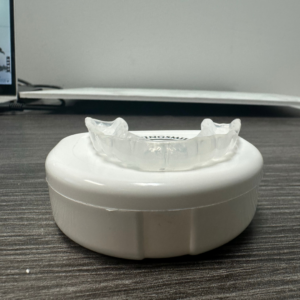
According to the Mayo Clinic, the temporomandibular joint (TMJ) acts like a sliding hinge, connecting your jawbone to your skull. You have one joint on each side of your jaw. There are people who suffer from TMJ which means they grind or clench their teeth together either throughout the day subconsciously, or while they sleep. This terrible habit can cause massive oral health issues if not addressed properly. How long does TMJ last? Let’s look at a few factors to determine the answer.

TMJ is triggered by factors like stress and anxiety. The more stressful your day, the more likely you’ll have a Bruxism flare-up at night as your mind unpacks from the day. Triggers like school, relationships, work, and unexpected events can cause bouts of teeth grinding. When you sleep at night your mind will react to your stress and anxiety and release it through the means of teeth grinding and clenching. But how lost does TMJ last?
In short term, TMJ can last as short as a few seconds, but it’s the consistency that causes the real damage. People who suffer from teeth grinding may only grind or clench for a few seconds at a time, but they will do it throughout the night leading to damage that will need to be repaired by a dentist. In severe cases of bruxism, some people may grind or clench their teeth for as long as 30 minutes at a time. This will deal massive damage to the teeth as they are worn down.
Some symptoms of bruxism include sensitivity to hot or cold foods/liquids, daily morning headaches, “popping” or “clicking” noises coming from the jaw joint, exposed nerves on teeth, and in extreme cases of years of TMJ, users may actually see a shift in their facial structure due to the filing down of the bone. These repairs to your teeth and oral health will need to be performed by your dentist but expect a heavy bill attached. That’s why it’s so important to protect yourself from TMJ and to understand the symptoms.
The Flexible Super Hard Night Guard is the strongest night guard available and is our No. 1 seller. Protect your mouth from severe teeth grinding and clenching with this teeth guard. Order online and take the impression at home saving hundreds over going to the dentist. Impression kit included. Free Shipping in the United States.…
How long does TMJ last long term? TMJ can last your entire adult life if not treated or prevented. As TMJ is triggered by stress and anxiety, you’ll likely face those triggers your entire life leading to a long battle against TMJ. It may sound scary but thankfully, there are a few easy things to do to help prevent any damage done by TMJ.
The first thing you should do is look for the signs of TMJ which we’ve already discussed. Once you determine that you have TMJ, or if you want to confirm it, you should schedule an appointment with your dentist for an examination. They can X-Ray and see how bad the damage is and if you’ll need any repairs. Your dentist will also be able to craft you a custom night guard. These are the best defense against teeth grinding and clenching and will eliminate all the side effects of TMJ. While a custom night guard will give you maximum protection, it can be very expensive when purchased through your dentist. Thankfully, there are other solutions.

SportingSmiles has been in business since 2009, crafting custom night guards. With the patented impression kit, customers can take impressions from the comfort of their homes and send them back to the SportingSmiles lab with free 3-way shipping. This entire process is done from the safety of your home and customers receive the same high-quality night guards to prevent teeth grinding as they would from the dentist but at half the cost.
When you wear a night guard while you sleep, you won’t have to wonder how long does TMJ last, because you’ll be fully protected from the horrors of teeth grinding and clenching. TMJ can last a few seconds or up to a few hours in the short term, but it can last a lifetime coming and going as your stressful triggers cause it. The best way to stop TMJ is to wear a night guard.